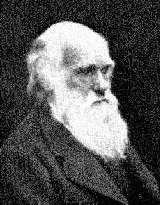
Born: February 12, 1809, in Shrewsbury, Shropshire, England
Died: April 19, 1882, in Down, Kent, England
Charles Darwin was born into a well-to-do family and was independently wealthy all his life, leaving him free to devote his energies to his studies and writing. His maternal grandfather was Joseph Wedgwood of Wedgwood china fame. His father and paternal grandfather were both physicians, and after attending a private school in Shrewsbury, Darwin entered the University of Edinborough in order to become a physician himself. However he later quit and entered Christ's College, University of Cambridge in 1828 to prepare for taking Holy Orders for the Church of England. Once at Cambridge, however, Darwin significantly changed the direction of his studies – and eventually modern thought. He was influenced by teachers Adam Sedwick and John Stevens Henslow who instructed Darwin on the importance of scrupulous specimen collection and observation.
In 1831 Darwin graduated and set sail on a scientific journey aboard the H.M.S. Beagle. On this voyage Darwin worked as an unpaid naturalist, observing geological formations and fossils around the world. His conclusions disputed the catastrophe theory of the day which held that species were immutable and that the only contemporary creatures which had survived the last catastrophe (Noah's flood) were those taken onto the ark. His report, Journal of Researches into the Geology and Natural History of the Various Countries Visited by H.M.S. Beagle was published in 1839. In this year he also married his first cousin, Emma Wedgwood and they moved to a small estate outside of London. Three of their ten children died in infancy.
Although the Beagle voyage launched his career in science, it significantly damaged his health and he was unable to work for more than a few hours at a time after the trip. Others such as Thomas Henry Huxley later took on the task of defending Darwin's controversial findings and theories. These were launched by an epiphany Darwin experienced while reading Malthus' theory of natural population growth and control. He applied Malthus' theory to plants and animals, and thus the beginnings of On The Origin of Species were born.
In 1858 another naturalist by the name of Alfred Russel Wallace also presented his independently developed theory of natural selection and the two collaborated on further work. In 1959 the first edition of On the Origin of Species was published – and sold out in one day. Darwin's theories were attacked by biologists and other scientists for up to 80 years afterwards. But by far the most vocal assaults came from the church, for his theories contradicted the notion of the divine creation of humanity. Darwin's notions were considered offensive because they effectively placed human's creation on the same level as the animals, and further, suggested that all related organisms are traceable to common ancestry.
His radical ideas incited tremendous change in the way the world was seen, influencing countless intellectuals and scientists, and even inspiring new fields of study such as genetics and sociology. In later years Darwin continued to write, expanding on sections of Origin. The significance of his work was recognized during his lifetime and he was buried in Westminster Abbey following his death in 1882.